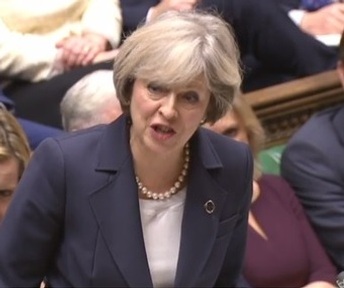MPs call on Theresa May to create cross party review for social care
Prime Minister Theresa May is being urged to invite all parties to engage in a cross-party review with the aim of finding a sustainable funding solution for social care before 2020.

The request was made in a letter sent today (6 January) jointly by the heads of three House of Commons committees: the Conservative MP Sarah Wollaston of the Health Committee, the Labour MP Meg Hillier of the Public Accounts Committee (PAC) and Labour MP Clive Betts of the Communities and Local Government Committee (CLG).
The letter stated: ‘We recognise the need for a political consensus in finding answers to the pressing social care challenges facing the country, but feel this also must include the NHS.’
The letter written, in response to comments made by Theresa May at the Liaison Committee on 20 December, stated: “You also accepted the need for a review to find a way of funding social care sustainably for the long term.
“We believe that can be best achieved if there is a cross-party consensus and therefore urge you to invite all parties to become involved in a review, which should begin as soon as possible.”
The letter said the Health Committee had already concluded that the social care system ‘is now at breaking point’ and the CLG Committee would publish its findings shortly, while PAC is scrutinising the financial sustainability of the NHS in a hearing taking place next week.
No quick fixes says Theresa May
Five days before Christmas, the Theresa May told Clive Betts at the Liaison Committee: “We want to make sure that we have a solution that will be sustainable. But this is not going to be an immediate, ‘Let’s have a quick review over a matter of weeks’, and that’s it. We are going to have to look at this.”
The chairman of the Local Government Association's Community Wellbeing Board, Councillor Izzi Seccombe, said: "We completely support the select committees in urging the Prime Minister to reach a cross-party agreement on the future of health and social care funding.
"Following last month's Local Government Finance Settlement, we said there needed to be an urgent and fundamental review of social care before the spring Budget, and we are pleased the select committees back this.
"But it is absolutely vital that local government leaders, who are responsible for social care in their local community, are part of that review.
"This is imperative to get a long-term, sustainable solution to the social care crisis that the most vulnerable people in our society deserve."
The LGA estimates there is a £2.6bn funding gap facing adult social care. This includes £1.3bn needed now to stabilise the provider market, and a further £1.3bn by 2020 to deal with additional pressures brought about by an ageing population, inflation and the cost of paying the National Living Wage.
In December, the Government announced adult social care will receive an extra £900m funding over the next two years, with councils being allowed to raise council tax further to pay for social care - by up to six per cent over two years, rather than three.
More and more older people have been living without the care they need or paying for their own care homes and home care as councils pay for services for the poorest. People with assets of more than £23,250 are expected to pay the full cost of care themselves.
Richard Kramer, deputy CEO of disability charity Sense, said: “The stark warnings on the fragility of the social care sector are finally hitting home and we welcome the call for a cross-party review tasked with finding a sustainable solution to this growing crisis ahead of the next spending round.
“In the last year, 11.4 per cent fewer people with sensory impairments received social care support compared to the previous year, as a direct result of systematic underfunding forcing councils to ration services.
"With an ever-growing funding gap, projected to hit £2.6bn by 2020, it is inevitable that more and more disabled people will be left without social care support unless an urgent funding solution is found.”
Latest News
 29-Jul-24
Dementia Bus gives carehome.co.uk staff insight into life with dementia
29-Jul-24
Dementia Bus gives carehome.co.uk staff insight into life with dementia
 01-Mar-24
Find out the top care homes in 2024
01-Mar-24
Find out the top care homes in 2024
 21-Mar-23
UK's top care homes in 2023 revealed
21-Mar-23
UK's top care homes in 2023 revealed
 03-Jan-23
carehome.co.uk launches free care helpline
03-Jan-23
carehome.co.uk launches free care helpline
 13-Dec-22
5 mins with Emily Whitehurst, chief operating officer for Constantia Healthcare
13-Dec-22
5 mins with Emily Whitehurst, chief operating officer for Constantia Healthcare